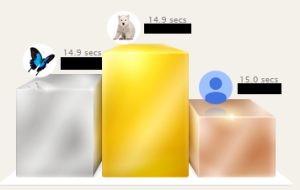After reading Tom Sherrington’s excellent post outlining his teaching aims for the next year, and Helen Rogerson’s equally excellent follow-up, I was inspired to write my first ever blog post. It is particularly exciting for me because I will be changing my school, hemisphere and position of responsibility in July. So, here is my pedagogical to-do list for the new school year.
Work towards more low-stake testing
I have been experimenting with low-stake testing this year. While I have taken a similar approach before, I was keen to combine it with interleaving too. The results are still to be borne out, but my observations suggest that those students who struggle to apply the theory to new situations are benefiting from this approach. Next year I hope to introduce a weekly mini-quiz, where I spend some time afterwards sharing the way I would answer the question before giving students an opportunity to note down the mistakes in their logic and note the steps I took when modelling.
I will also start developing IB definitions from the beginning, rather than waiting until the second year of the course. I have realised that it is so much more than memorising, but actually gives students a peg to hang their understanding on. I would be interested to find out if asking students to write out the definitions before the topic may be used as a way of pre-testing.
Continue to work on questioning
Questioning is one aspect of my practice that I will never be happy with. The recent Future Learn course for AfL in STEM subjects has made me aware of the bad habits I had slipped into. I allow more thinking time than I used to, but for students with English as their second language they sometimes need a bit of extra time to translate their ideas. I will also need to stop subconsciously pointing at the correct answer!
Develop more hinge-point questions
The AfL course has also made me realise how weak some of my hinge-point questions are. Too many of them may not highlight misconceptions, while others may open up a dialogue instead of allowing for a quick formative assessment. I have realised that these are best developed collaboratively and I will work with my new colleagues to develop a bank of quality questions.
Continue with Lesson Study
Perhaps more a professional development focus, but I have found it really useful in my lessons. I first came across Lesson Study when reading for my Masters, before finding out that many schools in the UK were already trialing it successfully. I have found the whole experience incredibly useful, and it has made me really analyse what good teaching is, where the evidence comes from and why we do particular activities. This year I have been working outside of my subject area and am currently designing a Music lesson with a Music teacher and an English teacher. This has been more powerful in many ways, as any preconceptions about which activities ‘must’ be done can be cast aside. I want to continue with this and hope I can find a new pair of teachers who are willing to give it a go.
Refine my practicals
For some time now I have been developing a practical programme that encourages students to engage with the scientific ideas, rather than confirm what they have been looking in class. I have started designing some practicals which provide cognitive conflict and makes the students address their misconceptions.
My current head of science has also convinced me of the power of evaluations. Previously I had considered the conclusion to be the most important part of an experimental write-up, but often a consideration of the variables and how they may have contributed to the results allows for a much greater consideration of the physics behind the investigation. With the IB programme moving towards one Internal Assessment this should also improve the students’ ability to design an investigation as well as cement the theory a little more.
With this in mind, I need to develop more practicals which encourage discussion and expose students to their misconceptions. This will be a challenge as I have been very fortunate to have access to an incredibly well-equipped department in my current school, and my new school will not have the same resources.
Develop more on-line resources
I have been experimenting with Edpuzzle and Quizlet recently. I have never been one for trialling an idea blindly, and am still to be convinced that the flipped classroom model will improve on the learning in my lessons, but I can see potential in some particular concepts. My 6th form Physics class have taken competition to a new level, using the Quizlet games to developtheir definitions. The nature of these activities should also lend itself to interleaving the topics, as the homework can be quick and structured.

The competition is heating up
There are so many more I would like to focus on, but I will have a new system, a new school and a new department to consider for the time being.
